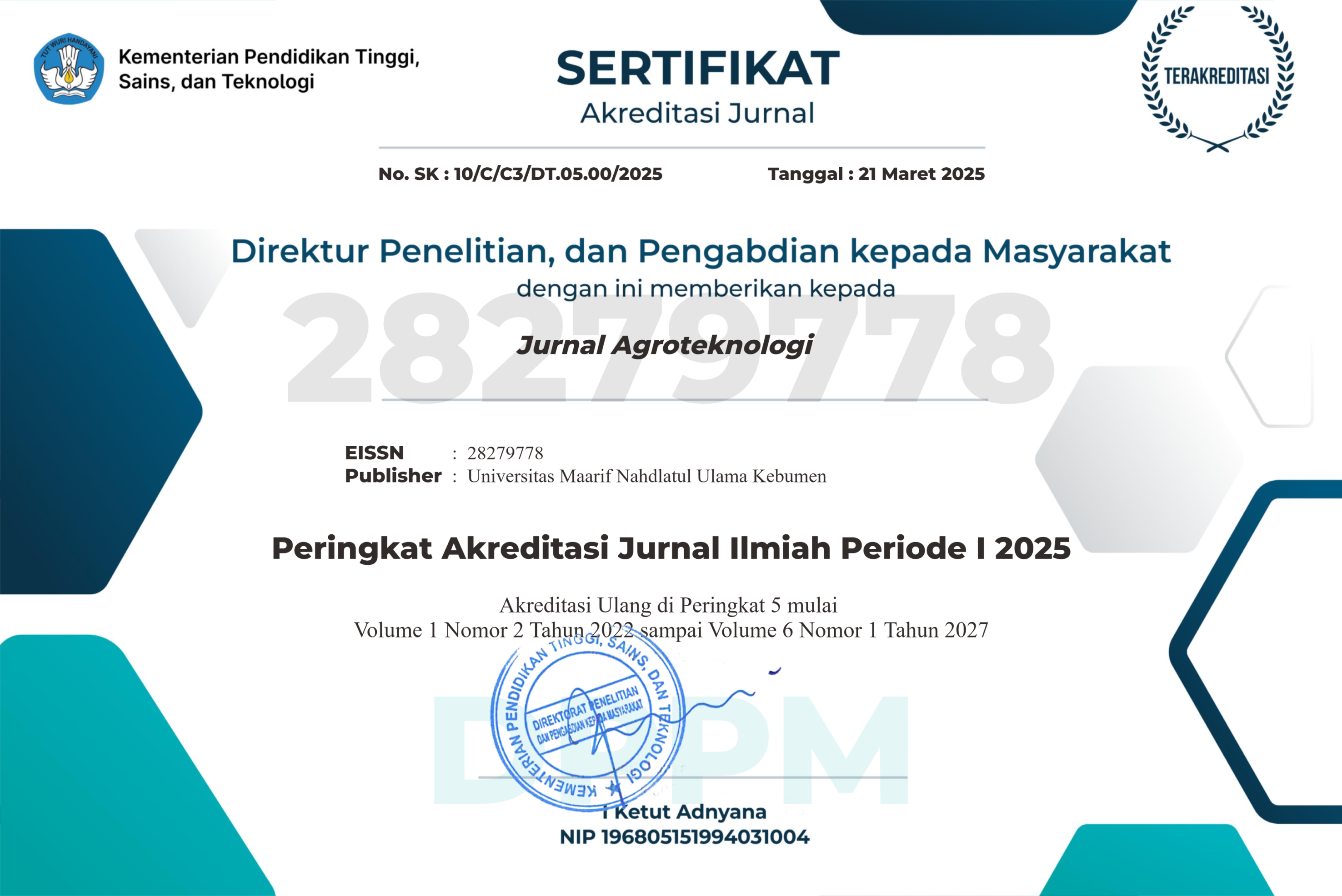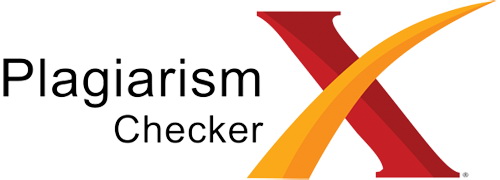Publication Ethics Statement
Jurnal Agroteknologi (Agronu) is an electronic journal whose professional management works with several stake holders in its management. Therefore, explanations related to publication ethics apply to all parts involved in the publication of articles. Among them are authors, editor-in-chief, Editorial Board, bestary partners, and publisher (Agrotechnology Department, Universitas Ma’arif Nahdlatul Ulama Kebumen).
Publication ethics is important and must be adhered to by publishing institutions, the principles of honesty, neutrality, justice need to be upheld to produce quality publications, therefore AGRONU Journal in establishing publication ethics refers to the Regulation of the Head of LIPI Number 5 of 2014 concerning the Code of Ethics for Scientific Publications, which essentially upholds three ethical values in publications, namely: Fair play, Confidentiality, Disclosure and conflicts of interest and Our Publication Ethics is based on the Code of Conduct and Best Practice Guidelines for Journal Editors of the Committee on Publication Ethics – COPE (available at http://publicationethics.org/).
Authors must be aware that the Jurnal Agroteknologi (Agronu) is an open access journal. The journal publishes two issues a year (published in January and July with the scheme "Publish us you go/ In Press"). All articles are available to readers for free without any subscription. All content is available online, including previous publications and articles.
The Editorial Board is responsible, among others, for deciding which research articles to publish and preventing publication malpractice. Behavior that violates ethics is unacceptable and not tolerated.
Responsibility of the Editor
Publication Decision: Editors should be responsible for everything published in the journal and should strive to meet the needs of readers and authors. The editor's decision to accept or reject a manuscript for publication should be based on the editorial board's review and the manuscript's merit.
Manuscript Review: The editor should be ensure that each manuscript is first evaluated by the editor using appropriate means to check the originality of the content of the manuscript and ensure the quality of the material to be published.
Fair Review: Editors should be endeavor to ensure that reviews are fair. Ensure that each manuscript received is evaluated based on intellectual content without regard to gender, race, religion, nationality, etc.
Confidentiality: The editors and editorial staff ensure that information regarding manuscripts submitted by authors is kept confidential.
Authors Responsibility
Reporting Standards: Authors should present their original research appropriately.
Authenticity: Authors must certify that their work is completely unique and original not plagiarized.
Redundancy: Authors should not submit articles describing essentially the same research simultaneously. Submitting the same paper to more than one journal is unethical and unacceptable behavior.
Sources: Authors must acknowledge all sources of data used in the research by way of citation
Authors of the article: All persons who have contributed significantly to the research should be listed as authors. The corresponding authors should also ensure that all authors and co-authors have seen and approved the final version of the submitted manuscript and their inclusion as authors.
Data Access and Storage: Authors should retain raw data related to the submitted manuscript, and should make it available for editorial review, upon request of the editor.
Fundamental errors in the published work: When an authors discovers significant errors or inaccuracies in the submitted manuscript, the authors should notify the editor immediately.
Reviewer Responsibilities
Confidentiality: Reviewers, editors, and editorial staff should not disclose any information regarding the submitted manuscript. All submitted manuscripts should be treated as confidential information.
Acknowledgment of Sources: Reviewers should ensure that authors have acknowledged all sources of data used in the research, any assertion that an observation, derivation, or argument has been previously reported should be accompanied by relevant citations.
Objectivity Standards: Incoming reviewers will be conducted objectively. Reviewers should express their views clearly, with supporting arguments for the article being reviewed.
Timeliness: If a reviewer he/she is unable to conduct the review of an article as per the prescribed guidelines, or within the stipulated time, the Reviewer should inform the editor, so that an accurate and timely review can be ensured.
Conflict of Interest: All Reviewers must not have any conflict of interest with respect to the research, authors and/or institution.
Changes or Modifications to Published Articles
Withdrawal: Published articles will be retracted if the authors discovers significant errors. Before accepting a retraction request, the editorial board and editor-in-chief should talk to the authors communicatively. If the article is approved for withdrawal, the following will be implemented:
The article in the journal database will be deleted.
Links on the online publication site will be removed.
The following phrase or a similar phrase stating the reason will be displayed under the title of the paper in the Table of Contents and journal volume pages: (This paper was withdrawn due to a technical error).
Substitutions: A published paper may be replaced if the authors submits an updated paper. Before accepting a substitution request, the editorial board and editor-in-chief should talk to the authors communicatively, and at least the reviewer should check the progress. If the paper is approved for replacement, the following will be implemented:
The paper in the journal database will be replaced.
The link on the online publication site will be replaced.
The next phrase or a similar phrase stating the reason will appear below the title of the paper in the Table of Contents and journal volume pages: (This paper is replaced because the authors has submitted an updated version. Contact the editor if you want to check the old version).
The old version should be kept separately, and if someone wants to check the old version, the editor can send a PDF to him/her.
Note that replacement can only be done once, and only for technical repairs.
Deletion: Published papers will be removed if reviewers, readers, librarians, publishers, or other subjects notice significant errors or plagiarism. Before deleting a paper, the editorial board and editor-in-chief should talk to the authors adequately, and should allow sufficient time for an explanation from the authors. If a paper is approved for deletion, the following will be implemented:
The paper in the journal database will be deleted.
Links on the online publication site will be removed.
The following phrase or a similar phrase stating the reason will be displayed under the title of the paper in the Table of Contents and journal volume pages: (This paper was removed due to plagiarism).
Penalties
Double submission: If double submissions are discovered or known from other sources, the editorial board must check their status. If the double submission is confirmed as intentional, the review process will be terminated. The reason should be sent to the reviewer, editorial board and authors.
The author's name will be blacklisted, and the authors will not be able to submit papers to Agronu Journal for five years.
Double Publication: If double publication is found or known from other sources, the editorial board should check its status. If the double publication is confirmed as intentional, This will be reported to the editorial board and the authors.
It will be sent to the publisher who published the same (or very similar) paper.
The paper will be removed according to the "Removal" section in Section 4.
All authors' names will be blacklisted, and those authors will not be able to submit papers to Agronu for five years.











